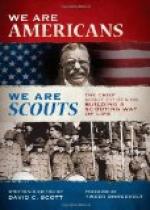I replied, “Capt. McKee, I got it from the head Chief of the Comanche tribe, and his word is law with all his warriors.”
Then the wagon master spoke for the first time since we started on our walk. He said, “In that case there is no need of all these men as an escort, is there?”
I answered, “That is none of my business; it is nothing to me how many men the Government employs to escort the trains. All I have to do with it is to do my duty.”
The Capt. inquired how I came to make such an arrangement with the Chief. I told him that I had the idea in my mind from the beginning, and that was the reason I wanted to go to the main village in advance of the train, so I could arrange everything to suit myself before the train came in sight.
The Capt. inquired how much it cost me to get the guarantee. I said, “The cost was considerable, but I think the teamsters will be willing to make it up to me, considering the trouble and perhaps loss of life I have saved them.”
The wagon boss said, “I reckon we all will want to take a hand in that payment. Tell me what it costs, and be it ever so much, you shall not be out a cent. I will go and see the boys right away and see if we can make it up. How much shall I tell them?”
I answered, “I promised the Chief two butcher knives for the safety of this train’s passage through the Comanche country, both going to Santa Fe and coming back.”
They both stared at me as if they were amazed, and finally the Capt. said, “What are you giving us? Are you joking or in earnest, Mr. Drannan?”
I answered, “I have told just what I promised to give the Chief. We did not call it ‘paying,’ and I have over three months to pay it in.”
Capt. McKee said, “Two butcher knives for the safety of all our lives and all the property in our care? How in the name of common sense could you make such a bargain as that?”
I answered, “There is nothing very wonderful about the transaction, Capt. I told the Chief that I would give him two butcher knives if he would tell his warriors not to molest the train either going or coming back, and he accepted my offer and seemed to think himself well paid. I told him that I would come to trade with his tribe in four months and that I would give the knives to him then.”
Capt. McKee asked how many more villages we would have to pass through. I told him that there were two more small villages. One was about ten miles, and the other one about fifteen or twenty miles above us.
He inquired if I intended to visit each of those in advance of the train as I had the ones we had passed; I replied, “I certainly do, for they would think themselves greatly insulted if I should visit the other villages and pass them by without paying them a visit too. The Indians are very much like children. If you notice one, you must pay the same attention to the others or there will be jealousy, and that is very much to be avoided in this case. Besides, I expect to trade with those Indians next spring, and I want to keep on the good side of all of them. If one gets the ill will of one Indian, the whole tribe is against one, and if you have the Chief on your side there is no danger from the others.”




